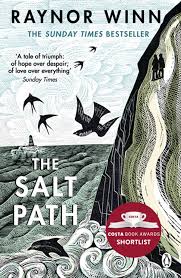
The Salt Path by Raynor Winn is an emotional and social commentary masking as a personal travelogue. In 2015 Ray and Moth Winn decided to walk the coast of Devon and Cornwall from Minehead to Poole. The path loosely retraced the journey of Paddy Dillon in The South West Coast Path and was inspired by Mark Wallington’s Five Hundred Mile Walkies. The route encompasses 630 miles of spectacular beauty as well as a topographical challenge. However, this is not the story of born and bred trekkers with the appropriate outdoor kit and the first world luxuries we have come to expect in this day and age. Ray and Moth are homeless. They have lost their home and their livelihoods – not by choice, but by a cruel twist of circumstance. They decide to walk. The challenge of this trek and of material circumstances it has the additional weight of Moth being diagnosed with a terminal illness that already causes him severe physical and mental anguish.
So at over fifty years of age, in challenging physical and material circumstances, the couple sets out to truly challenge themselves and all that there her experience has given them. This is both a story and a journey of deep engagement with the environment as well the self.
As a brilliantly thoughtful travelogue, it combines an appreciation of a sense of surround, but also of a revealing sense of self. The author bares her soul in a purely genuine fashion that draws you in with her tremendous generosity in sharing herself.
Throughout the tale, there is a deep engagement with the term homeless – without a home. This is a term that is negotiated by the protagonists as they live through the shock, self and externally imposed shame of reduced and radically changed circumstances. One appreciates the tremendous sense of overwhelming despair that one must feel facing such challenges. Yet as a means of coping with it all they choose to take this extraordinary journey.
In many ways, the journey springs from desperation. Yet as we come to know the character of the author and her husband, it is clear they both have an inner strength that has sustained them in the past. They are ordinary and extraordinary individuals. Nonetheless, the author deals honestly with the massive anxiety and doubt that dwells within herself – along with a deep sense of responsibility for those whom she loves and for which she cannot shirk.
So on one level, this is a well-told travelogue, and on another a social commentary. In tribute to a unique and exceptional writing style, Winn delivers a tale in which you naturally adopt and engage. Many of the people they encounter recoil from the couple when they honestly admit they are homelessness. I suspect many might in reading this in the description on the book jacket do the same, and that is the point. The author and her husband challenge the conventional stereotypes with evidentiary data and through their own actions and characters.
One of the questions in my mind early on was how the author came to actually write the book. I wondered both how and why she actually found the means to physically write it with the radically reconfigured life circumstances that the book recounts. But it is simple curiosity and not any disbelief with the tale. It is really just the kind of genuine engagement with this real-life story that draws you in and impels you to ask and want to know more.
This book was shortlisted for the 2018 Costa book Prize – quite justifiably. It is a multilayered tale, created, crafted and told with often painful truth, sometimes humorous and but always profoundly endearing. I read on because I felt invested in the story and in the protagonists’ lives. Likewise, I am already jumping into the sequel, The Wild Silence.
The Salt Path is a personally enriching read and a similarly unique experience for the author herself. I highly recommend the book!
